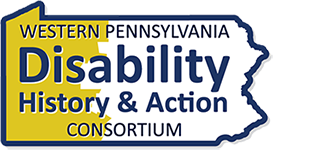The Western Pennsylvania Disability History and Action Consortium was established in 2015 to preserve and honor the historic struggle of Western Pennsylvanians with disabilities to attain human and civil rights. The Consortium educates the public about disability history in order to improve community access, participation and equal opportunity, and to ensure disability rights through existing and new policies and laws.
Over the last five decades, landmark federal laws have been enacted to protect the rights of people with disabilities. Prior to the groundswell of advocacy for such laws, people with disabilities were routinely excluded from the mainstream of community life and equal opportunity. Many thousands were institutionalized, subjected to mistreatment, and denied appropriate education.
The Consortium reflects efforts across Pennsylvania and the nation to use history to educate the larger community about ongoing advocacy for equal opportunity, full participation, and humane policies and laws.
The struggle by and for people with disabilities to attain human and civil rights has only recently been recognized as part of American history. In many locations — including Western Pennsylvania — the dramatic changes that have occurred have not been sufficiently documented, preserved or shared. Attention to do so is growing, along with the understanding that history can be an effective tool to create more inclusive communities.
Western Pennsylvania is home to a significant amount of disability history. The region has a strong record of grassroots advocacy to ensure public education, transportation, and other services, and to end the segregation of people with disabilities in the region’s state-run institutions.
The Consortium takes the lead on preserving and sharing that history. We welcome the participation of individuals and organizations that share this interest.
People with disabilities are the primary and leading force in the Consortium’s documenting and sharing disability history. In all its programs and activities, the Consortium includes people of diverse backgrounds and does not discriminate on the basis of disability, race, color, religion, national origin, ancestry, genetic information, marital status, familial status, sex, age, sexual orientation, veteran status or gender identity and expression.


